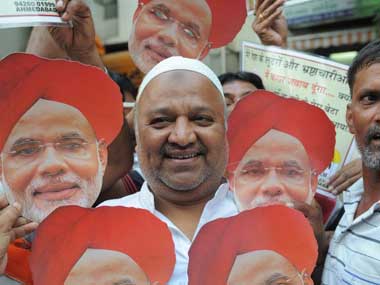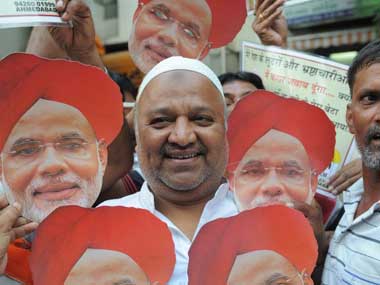After the communal rioting at Muzaffarnagar, the Muslim mind must be in a churn. With elections just round the corner, the chances are they will once again come to the wrong conclusion - driven by the usual emotions of fear, anger and a sense of betrayal. They may not consider the one rational choice they may have - and which they haven’t really tried so far - of doing a deal with the BJP and Narendra Modi, but on their own terms. I will explain the logic of this deal later. First, let me outline a short history of Muslim political history in India to give you the backdrop. Muslims in pre-partition India were the strongest supporters of Jinnah and the idea of Pakistan. But the logic of demography left Jinnah with a “moth-eaten” Pakistan, and orphaned most of his ardent supporters in post-partition India. This Muslim mass then latched on to Nehru and the Congress as their best hope of safety, and every Congress leader worth his salt has since reminded Muslims (usually by scaremongering about the Sangh Parivar) that they should be grateful for protection of life and limb. Muslims had no option but to accept this rotten deal. Whenever they looked at alternatives, it suited the Congress to have a little riot to remind them it was their only protector. After the fall of the Babri Masjid, Muslims saw that the Congress could not honour even this rotten deal. They then went in search of other protection racketeers and found them aplenty in regional parties such as Mulayam Singh’s SP, Lalu Prasad’s RJD and the Left Front. Nandigram and Muzaffarnagar have shattered even this illusion. They now know that it is foolish to rely on even so-called “secular” leaders. The point is, at the end of the day, the likes of Mulayam Singh and Lalu Prasad need a significant chunk of Hindu/caste votes to come to power. They, too, effectively have to posture as secularists to get the Muslim vote while, in practice, having to appease caste or Hindu constituencies. At the centre of it all is something called the agency problem - or the principal-agent problem. Quite simply the agency problem is this: someone who is supposed to be your agent (the Congress, as the agent of Muslims, for example) may not always have your best interests at heart because he has his self-interest coming in the way. Thus a mutual fund agent may advice you to buy the wrong scheme because he gets a higher commission on it. A real estate broker looking (who is supposed to be your agent) may palm off a house he knows has a leaky roof because it is in his interest to get the deal done quickly to collect his brokerage. In the Congress-Muslim equation, the agency problem is that the Congress claims to represent everybody, and particularly the minorities, as chief protector and benefactor. But the political reality is that you can’t win with 14 percent of the population as your prime constituency. Effectively, the deal Muslims got was the Congress would pander to power-brokers among Muslims, and forget about the interests of the ordinary Muslim. [caption id=“attachment_1111407” align=“alignleft” width=“380”]  Better off with rather than against Modi? Representational image. AFP[/caption] Since visible pandering to minorities has its electoral cost in terms of majority community perceptions, the so-called “secular” parties effectively balanced this by giving the majority community actual benefits in practice while denying it to the minorities. A fine example of this is The Times of India report today (16 September) that shows that schemes intended for the minorities were hijacked by non-minority interests. The story quotes a report titled Social Development Report 2012: Minorities at the Margins, which was written with inputs from academics and intellectuals, including Abusaleh Sharif (who was part of the original Sachar Committee on minorities), Zoya Hasan, Tanweer Fazal, Mushirul Hasan and Javed Alam Khan. According to TOI, “the report listed misplaced focus of minority-oriented programmes, lack of funds and fear of ‘minority appeasement’ taunts as the reasons for the government’s failure to fulfil its promises.” As an example, it points out how money got spent in madrasas even though only 4 percent of Muslims go there for education. But money actually intended for investment in districts with a significant Muslim population reached only 30 percent of the Muslims – which means 70 percent of the intended benefits for Muslims went to others. The conclusion Muslims should draw from this is clear: a party that claims to represent every community may not really be in their interests. Consider how every party seems to represent at least one community. Mayawati represents Dalits, Mulayam Singh and Lalu represent Yadav and the better-off OBCs, Deve Gowda’s Janata Dal (Secular) represents Vokkaligas, Prakash Singh Badal represents Sikhs, the Shiv Sena and MNS represent Marathis, and so on. In this context, the BJP can broadly claim to represent a Hindu constituency – even though it cannot claim to represent all Hindus, just as the Akalis do not represent all Sikhs or Mayawati all Dalits. Put another way, many parties have, in some sense, solved the agency problem by representing a core community. The agency problem arises with respect to Muslims because every party other than Muslim parties claims to represent them – and ends up selling their interests down the river. Reason: they are primary agents for some other group. Now, consider how Malaysia has solved the agency problem. No one is under any illusion that the United Malays National Organisation represents anyone other than Muslim Malays. It does not claim to represent Hindus in Malaysia or the Chinese, who are represented by their own parties in the central coalition. That’s why a power sharing deal is possible – there is no overlap of constituencies or agencies. In Kerala, too, this is the case. The United Democratic Front has constituents who represent Muslims, Ezhavas, Christians, Nairs and other communities through separate parties. One party does not claim to represent everybody. It is not as if Muslims have not realised this. This is why one sees the emergence of regional Muslim parties such as the AIUDF in Assam, the MIM in Hyderabad (and now Nanded), and various other Muslim parties in various regions (Welfare Party in West Bengal), Peace Party in Uttar Pradesh, the Muslim Munnetra Kazhagam in Tamil Nadu, et al. Muslims are slowly rediscovering the power of agency. They want to be both principal and agent when offering their votes. (For more on the Muslim discovery of their power of agency, read here and here ). The question, though, is this: can they do so by pretending that the BJP does not exist? What is the logic of doing a deal with “secular” parties when they are themselves “communal”? How can the Muslim League, which is by definition communal, do a deal with “secular” parties or vice-versa? Can “secular” parties deliver Muslim demands better than parties claiming to represent largely the majority community? In Gujarat, some canny Muslims – a small group, but clearly not the majority of them yet – decided to talk directly to Modi and got themselves real deals on the ground that work. Zafar Sareshwala is one of those who articulates this idea strongly. To be sure, Gujarat has not solved its communal problem, but these deals give Modi and the BJP a stake in communal peace. In contrast, Mulayam Singh’s leadership of Muslims gives him a stake in keeping Muslim fears alive, not partnership. The Malaysia and Kerala power-sharing models suggest that Muslims should be in a dialogue with Modi and the BJP for a power-sharing arrangement rather than place themselves in opposition to him. Three reasons why: unlike Congress, the BJP cannot claim to represent Muslims. So Muslims get their own space and agency. Unlike secular parties, the BJP and Modi are more sensitive to the communal tag, and hence have a vested interest in proving themselves to be otherwise when in power. And lastly, a Hindu-Muslim power-sharing deal is an unbeatable electoral combo. In a country where identities do matter, power sharing on the basis of community identity is likely to be a better guarantor of secular politics in the short run - at least till we grow out of the need for narrow identities. Secular politics has not matured to the point where it is actually non-communal. This is why we had a Rajiv Gandhi reversing a Shah Bano judgement and allowing the Shilanyas ceremony of the VHP. When a party claims to represent everybody it effectively panders to narrow interests. Those who claim to represent everybody may end up representing nobody.
If after more than 60 years of voting for secular parties Muslims still think they are badly done by, surely there is something wrong in the way they have analysed their situation
Advertisement
End of Article
Written by R Jagannathan
R Jagannathan is the Editor-in-Chief of Firstpost. see more


)

)
)
)
)
)
)
)
)



